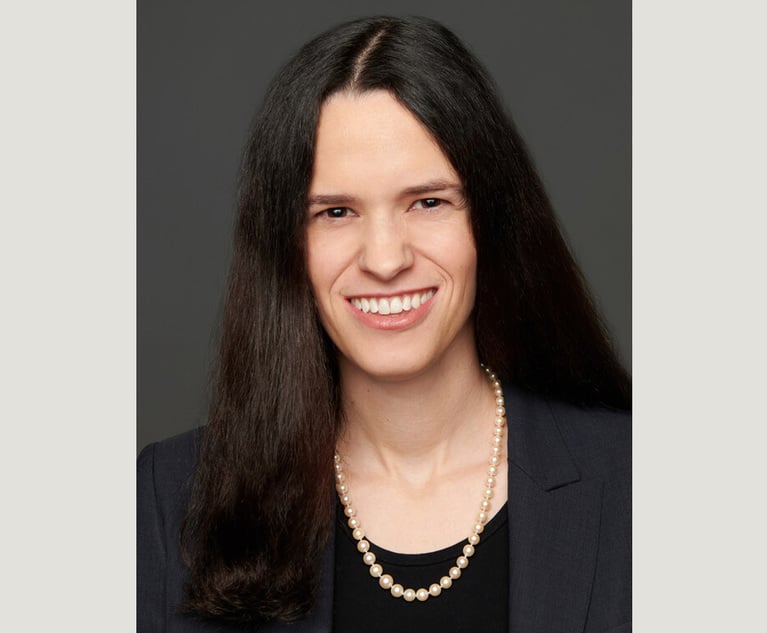 Photo: Billion Photos/Shutterstock.com
Photo: Billion Photos/Shutterstock.com Patent Agent Fights Identity Theft Over Fraudulent USPTO Filings From China
After being told that her signature had been forged on hundreds of bogus U.S. trademark applications, Miriam Paton said she sought advice from an IP ethics expert and worked with the U.S. Patent and Trademark Office to clear her name and resolve a misconduct investigation.
March 04, 2019 at 03:45 PM
5 minute read
Canadian patent agent Miriam Paton's signature was already forged on hundreds of U.S. trademark applications before she discovered what was happening. Her effort to clear her name, which she said took “a lot of phone calls and emails,” could help others who suddenly find themselves in a similar situation.
Paton was alerted about being the victim of identity theft in June, when the Office of Enrollment and Discipline told her that she was the subject of a misconduct investigation, she said Monday during a phone interview.
Aside from investigating potential wrongdoing, the OED also registers attorneys and agents to practice before the U.S. Patent and Trademark Office. Paton is a registered patent agent in the U.S. and Canada. But she said she doesn't practice trademark law and has never represented any party in a trademark matter before the USPTO.
“They [the OED] saw my name on trademark applications with Chinese applicants who are obviously not located in Canada, therefore I am not permitted to represent them,” Paton said. “Their concern was wrongdoing, if I was representing people who are not located in Canada.”
Paton declined to comment when asked why she thought she might have been targeted, but noted that her name appears on the USPTO's register of patent agents and also on all the patent applications that she represents at the USPTO.
In addition to allegedly forging her signature, Paton said the applicants also falsely identified her as a Nevada resident and connected her to bogus email addresses.
“My main concern was how to get my name off” the applications, Paton added. She said she called the USPTO and eventually was directed to the agency's Office of Policy and International Affairs, which helped her draft a declaration in which she publicly stated her signature had been forged on “several hundred trademark applications before the USPTO.”
The declaration allowed for her name to be removed from the trademark applications in question, and the OED has closed its investigation, according to Paton. She said remedying the situation took “days,” causing her to lose “a fair amount of time for work.”
“It took me a while to find the right people at the USPTO to speak with,” she said. “All the time I had to spend on it—and the worry: If they're using my name for this, what else are they fraudulently using my name for?”
The answer, at least for now and as far as Paton knows, is nothing.
When Paton was caught in the whirlwind of identity theft, she said she sought advice from Michael McCabe Jr., a lawyer in Potomac, Maryland, who represents attorneys and agents in ethics and disciplinary matters before the USPTO. He declined to discuss her case specifically, but said “fraud on the USPTO has reached massive proportions.”
“Many of those fraudulent trademark applications have been found to have been originating from China,” he added.
A USPTO representative was not available for an interview Monday. But the agency has stated the number of trademark applications coming out of the Chinese mainland increased by about 1,100 percent between fiscal years 2013 and 2018.
McCabe and other intellectual property lawyers say the spike in applications is tied to subsidies that the Chinese government has been paying to companies that register trademarks in foreign jurisdictions.
“You've got to be on the lookout for potential misuses of your name,” said McCabe, who acknowledged that being vigilant can be onerous.
“The only way an attorney is going to know if their name or identity has been hijacked is to search through the USPTO's database,” McCabe said. “For someone who does a lot of filings, that's a lot of unfortunate work to have to do.”
But he added, “It's like looking at your online bank statements to identify fraudulent charges. No one is going to tell you that information. You've got to go find it yourself.”
Correction: An earlier version of this article wrongly identified Miriam Paton as a lawyer. She is a registered patent agent in Canada and the U.S.
Read More:
This content has been archived. It is available through our partners, LexisNexis® and Bloomberg Law.
To view this content, please continue to their sites.
Not a Lexis Subscriber?
Subscribe Now
Not a Bloomberg Law Subscriber?
Subscribe Now
NOT FOR REPRINT
© 2024 ALM Global, LLC, All Rights Reserved. Request academic re-use from www.copyright.com. All other uses, submit a request to [email protected]. For more information visit Asset & Logo Licensing.
You Might Like
View All

Another Senior Boeing Attorney Exits, This One for CLO Post at Jet-Maintenance Company
3 minute read
Nation's Largest Utility Parts Ways With CLO Who Helped It Navigate Bribery Scandal

Trending Stories
- 1The Pusillanimous Press
- 2Contract Lifecycle Management Company ContractPodAi Unveils Leah Drive
- 3'Great News' for Businesses? Judge Halts Transparency Mandate
- 4Consilio Announces ‘Native AI Review,’ Expanding Its Gen AI E-Discovery Offerings
- 5Federal Judge Hits US With $227,000 Sanction for Discovery Misconduct
Who Got The Work
Michael G. Bongiorno, Andrew Scott Dulberg and Elizabeth E. Driscoll from Wilmer Cutler Pickering Hale and Dorr have stepped in to represent Symbotic Inc., an A.I.-enabled technology platform that focuses on increasing supply chain efficiency, and other defendants in a pending shareholder derivative lawsuit. The case, filed Oct. 2 in Massachusetts District Court by the Brown Law Firm on behalf of Stephen Austen, accuses certain officers and directors of misleading investors in regard to Symbotic's potential for margin growth by failing to disclose that the company was not equipped to timely deploy its systems or manage expenses through project delays. The case, assigned to U.S. District Judge Nathaniel M. Gorton, is 1:24-cv-12522, Austen v. Cohen et al.
Who Got The Work
Edmund Polubinski and Marie Killmond of Davis Polk & Wardwell have entered appearances for data platform software development company MongoDB and other defendants in a pending shareholder derivative lawsuit. The action, filed Oct. 7 in New York Southern District Court by the Brown Law Firm, accuses the company's directors and/or officers of falsely expressing confidence in the company’s restructuring of its sales incentive plan and downplaying the severity of decreases in its upfront commitments. The case is 1:24-cv-07594, Roy v. Ittycheria et al.
Who Got The Work
Amy O. Bruchs and Kurt F. Ellison of Michael Best & Friedrich have entered appearances for Epic Systems Corp. in a pending employment discrimination lawsuit. The suit was filed Sept. 7 in Wisconsin Western District Court by Levine Eisberner LLC and Siri & Glimstad on behalf of a project manager who claims that he was wrongfully terminated after applying for a religious exemption to the defendant's COVID-19 vaccine mandate. The case, assigned to U.S. Magistrate Judge Anita Marie Boor, is 3:24-cv-00630, Secker, Nathan v. Epic Systems Corporation.
Who Got The Work
David X. Sullivan, Thomas J. Finn and Gregory A. Hall from McCarter & English have entered appearances for Sunrun Installation Services in a pending civil rights lawsuit. The complaint was filed Sept. 4 in Connecticut District Court by attorney Robert M. Berke on behalf of former employee George Edward Steins, who was arrested and charged with employing an unregistered home improvement salesperson. The complaint alleges that had Sunrun informed the Connecticut Department of Consumer Protection that the plaintiff's employment had ended in 2017 and that he no longer held Sunrun's home improvement contractor license, he would not have been hit with charges, which were dismissed in May 2024. The case, assigned to U.S. District Judge Jeffrey A. Meyer, is 3:24-cv-01423, Steins v. Sunrun, Inc. et al.
Who Got The Work
Greenberg Traurig shareholder Joshua L. Raskin has entered an appearance for boohoo.com UK Ltd. in a pending patent infringement lawsuit. The suit, filed Sept. 3 in Texas Eastern District Court by Rozier Hardt McDonough on behalf of Alto Dynamics, asserts five patents related to an online shopping platform. The case, assigned to U.S. District Judge Rodney Gilstrap, is 2:24-cv-00719, Alto Dynamics, LLC v. boohoo.com UK Limited.
Featured Firms
Law Offices of Gary Martin Hays & Associates, P.C.
(470) 294-1674
Law Offices of Mark E. Salomone
(857) 444-6468
Smith & Hassler
(713) 739-1250






